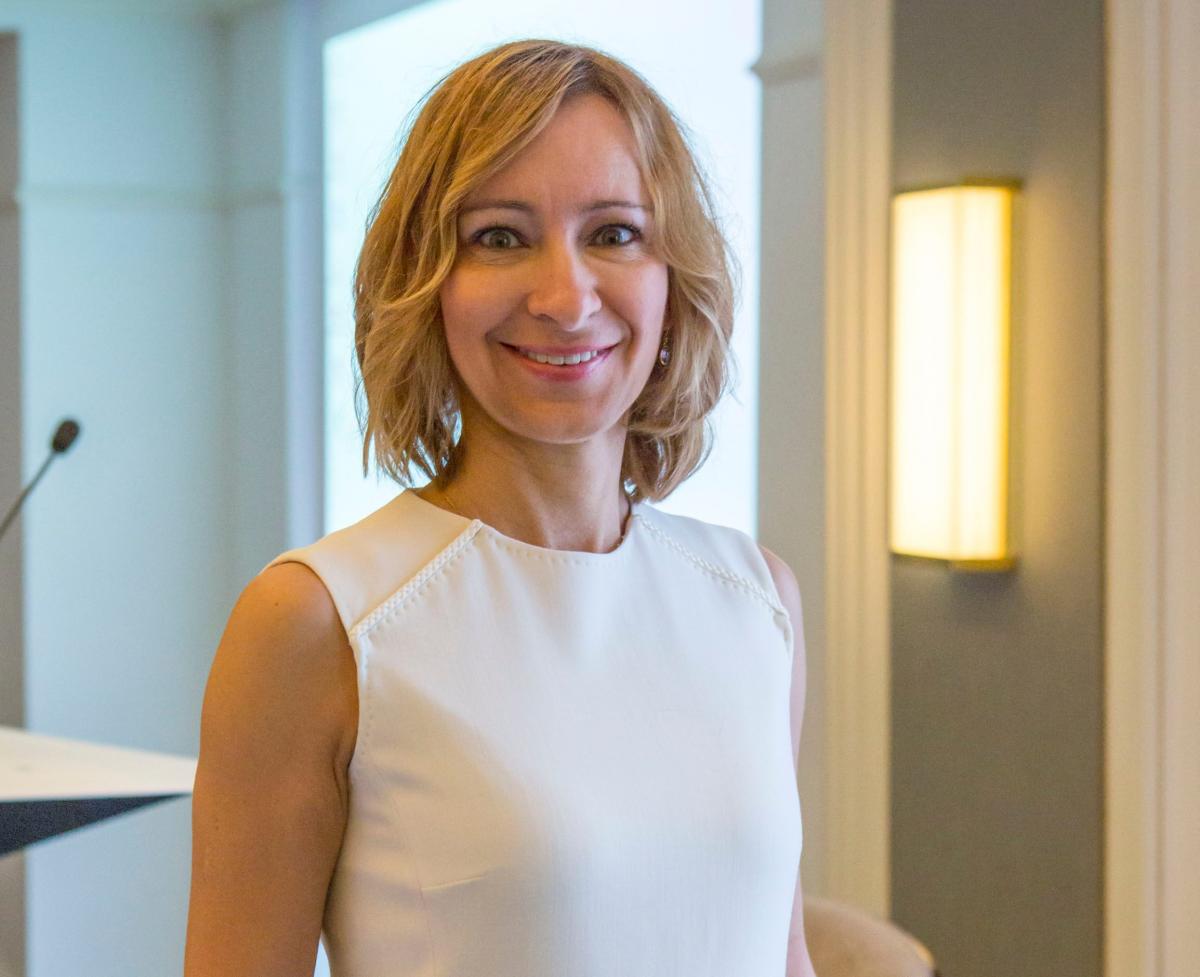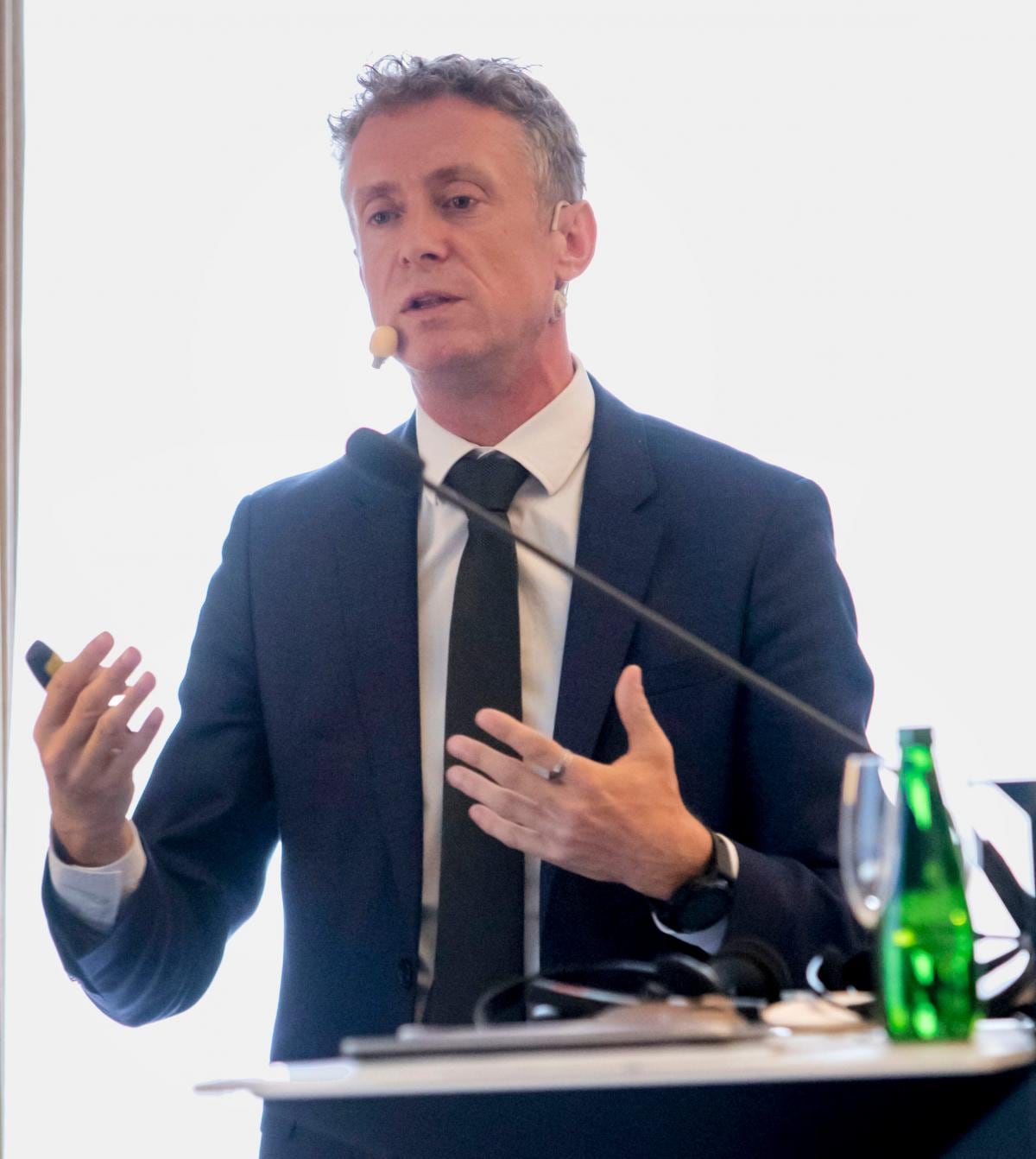Wrap up report
The Swift Business Forum in Warsaw took place at the Hotel Bristol on on 29 May 2019 and brought together more than 180 senior members of the Polish financial industry.
The theme for the day was “Poland: Embracing innovation and change in banking” and speeches and panel sessions throughout the day covered trends in financial services, the challenges and opportunities for financial institutions, and what Swift is doing to support its customers in this rapidly changing environment.

Opening remarks
Ilona Pouna, Regional Manager, CEE, Swift welcomed participants, pointing out that this was the fifth business forum to be held in Warsaw since 2011. Poland’s traffic has nearly tripled since 2011 and reached 80 million messages last year. She said “The financial industry has changed enormously since 2011, and the Swift community has adapted impressively fast to key industry challenges such as cyber security and improvements to the cross-border payments experience: in just two years, more than 90% of customers have complied with the Customer Security Programme’s self-attestation requirements; and on gpi, 10 banks are now live and 44% of transfers sent by Polish banks are done so using gpi.” In closing, Ms. Pouna reflected on the close and effective cooperation between Polish banks and fintechs, saying “each needs each other to thrive.”

Grazyna Cheetham, Polish Swift National Member Group (NMG) chairperson

Ilona Pouna, Regional Manager, CEE, Swift
Grazyna Cheetham, the Polish Swift National Member Group (NMG) chairperson, spoke next and highlighted two important anniversaries. “We celebrate the 46th anniversary of Swift itself, which was formed to create an alternative to the telex for financial messaging and to establish a standardised universal language to be used,” said Ms. Cheetham, and continued “since then Swift has continued to develop new solutions to meet market needs and its products compete successfully with those offered by fintechs.” The second anniversary was 30 years of Poland being on the Swift network, with 63 Polish banks and financial organisations and companies now connected. “The new challenges banks face, such as increasing regulation and competition, will provide the stimulus for new innovation” she concluded.
Swift2020 update
Taking over from Ms. Cheetham, Swift Board member Soren Haugaard stressed the importance of countries such as Poland to the Swift network. “The value of the network is insignificant without countries such as Poland, and it is important that its voice is heard,” he said. Mr Haugaard then turned to Swift’s current 5-year strategy, which continues to evolve as times change. “The Swift Board reviewed the strategy 12 months ago and mandated Swift management to accelerate the strategy in key areas, particularly gpi and APIs, to allow Swift to continue to respond rapidly to the changing market and competitive environment,” said Mr Haugaard. He reported that the Board had also asked Swift management to step up the game in three areas: 1) the migration of cross-border payments to ISO 20022; 2) the application of data analytics to provide business insights, which are crucial for Swift members; and 3) the continued evolution of the CSP to address the evolving threat. At the same time, Swift was asked to continue its successful strategies in securities, instant payments, and financial crime compliance. “It is important to step up and take a wider responsibility,” he said. He reflected that migrating from the MT structure to ISO 20022 will take effort and energy, but it is an important undertaking for the industry; and he cited CSP as another area where Swift had acted quickly and effectively for the benefit of the community.
The value of the network is insignificant without countries such as Poland, and it is important that its voice is heard.
Banking sector environment
The first keynote speech of the day was delivered by Professor Lech Kurklinski of the Warsaw School of Economics. He gave an overview of the Polish banking sector, saying that there has been a decline in the number of commercial and cooperative banks in recent years. At the end of 2018 the Polish financial landscape included 32 commercial banks and 549 cooperative banks as compared with 35 and 553 institutions respectively in 2017. In general, the large banks in the sector are getting stronger and account for 73.5% share of the sector by assets, while the small and medium sized banks are finding the environment more challenging as they struggle to comply with increasingly stringent regulatory requirements and changes in technology. There has been a steady growth in internet banking – the incumbent banks have a good offering and are trusted by the public. Although the banks are in a strong position, they do however face competition from fintechs and the big technical providers.

Professor Lech Kurklinski, Warsaw School of Economics
Evolution of the European payments landscape
The first panel of the day was on the evolution of the European payments landscape, and was moderated by Isabelle Olivier, Head of Securities & Payments Market Initiatives, Swift and panellists were Ann Borestam, Adviser, Market Infrastructure and Payments, ECB; Michal Szymanski, Vice-President, KIR; Adam Tochmanski, Head of Payment Systems, National Bank of Poland; and Carlo Palmers, Head of Payments Market Infrastructures, Swift.
In her opening remarks, Ms. Borestam said that “the pace of development in the payments industry was incredible and had properly got underway with the introduction of the smartphone.” New actors, new technologies, new business models, the demand for real-time and the trend towards globalisation were all factors in the development of more innovative payments solutions. “Traditional methods of payment will not disappear, but they will become less visible,” she said. Ms. Borestam went on to point out that Generation Z has grown up with smartphones and they are very familiar with mobile apps to manage their finances. “When it comes to payments, they are looking for one-click convenience and simplicity,” and she stressed the importance of the industry providing user-friendly payment solutions at the point-of-sale and online shopping. She highlighted the TARGET Instant Payment Settlement (TIPS) system, launched by the ECB in November 2018 as it enables payment service providers to offer fund transfers to their customers in real time and around the clock, every day of the year. As the panel session got underway, Ms. Olivier set out the main drivers of change in the payments industry, saying “customer demand for fast, frictionless, transparent payments; new competitors; the emergence of new technologies; regulatory requirements – such as PSD2 and Open Banking - that ensure a level playing field; and the fact that many market infrastructures are undergoing modernisation – all of these elements are diving change.”
Michal Szymanski and Adam Tochmanski agreed that regulatory changes, such as PSD2, are having a significant impact on markets, and that time will tell if there will be any downsides alongside the benefits. The panel agreed that new entrants to the financial industry are important in helping to drive change, as they encourage banks to innovate and change their business models. The panel also discussed instant payments, noting that instant payments systems are being implemented in many parts of Europe and indeed the world. Instant Payment was qualified as a financial product that facilitates innovation. Instant payments have been possible in Poland for several years, and the Express Elixir system was the second instant payments system to be launched in Europe after the UK launched theirs. Looking ahead, work is underway on a solution for banks to connect with the TIPS and RT1 systems of the Eurosystem and EBA Clearing respectively. On the topic of cross-border payments, the panel agreed that the time has certainly come to streamline and that gpi is an important initiative. The panel also talked about innovation and the role of fintechs, especially in the provision of overlay services, potentially allowing payments to become invisibly embedded into products and services. Banks are already teaming up with fintechs and technology companies to tailor services for their end users.
Finally, Adam Tochmanski confirmed that the Polish market is getting prepared for the T2-T2S consolidation project. After completion of this important milestone, he informed the audience that they would look into the evolution of the current Polish RTGS, speaking about SorbNet 3.
Swift GPI
The next panel was on the progress made on Swift’s gpi service and was moderated by Anton Piatygin, Associate Partner at McKinsey CEE office. Panellists were Ewa Drożdż, Director of Settlement, Risk & Treasury IT Development Bureau, PKO BP; Marianna Janssen, gpi expert EMEA, Swift; Jarosław Loba, Transaction Banking Product Manager, Global Transaction Banking Department, Santander Bank Polska S.A.; and Katarzyna Szumilas, Director, International Cash Management Unit, GTB, Pekao Bank.
In his opening remarks, Mr. Piatygin gave an overview of the cross-border payments landscape, saying “this is a growth area with further shifts towards new corridors and segments expected.” Ms. Janssen gave the latest gpi statistics, including that gpi has reached a critical point with more than 50% of Swift payments being sent as gpi, covering more than 1,100 country corridors. “We’re observing great results from gpi,” said Ms. Drozdz. “We know every step of the payment and have all the information to hand if there is a problem”, she continued. Mr. Loba agreed, saying “I am regularly asked about gpi by our corporate customers – does your bank offer gpi, and in which currencies?” On the topic of technology, Ms. Drozdz commented that “the technology giants and fintechs entering the financial industry are major drivers of innovation.”
Ms. Szumilas followed up, saying “Human creativity drives us to want instant, one-stop availability – technology follows and then the regulators must try to formalise it.” Ms. Janssen added “Regulation forces the banks to review their existing processes and business models and to change their approach and processes where needed.” The panel agreed that, over time, technology would streamline and simplify the cross-border payments landscape, creating anytime/anywhere availability, and reducing the costs. Mr. Piatygin suggested that the threat to the banks is that they may become more commoditised, but they will not be content to be utilities providing the rails. He said “The banks are already responding – it is not only the fintechs trying new things.” The panel agreed that banks have to maintain legacy systems as well as developing new services and processes, and this will not pay off immediately. Fintechs do not have the scale as banks, nor the regulation to contend with, but nor do they have the trust that the banks have.
In a brief address to conference participants, Jacek Jastrzebski, Chair of the Board of the Polish Financial Supervision Authority, underlined the critical importance of Swift in the development of Poland’s banking sector, and looked forward to broadening the scope of collaboration between the two organisations.
Fintech and finance
The first keynote speaker of the afternoon was Slawomir Lachowski, founder of mBank and CEO and Chairman of Golden Sand Bank. In his presentation “Reinvent or die: Financial services in the era of digital revolution”, Mr. Lachaowski said “creating a bank from scratch is quite a challenge - regulation has created quite high entry barriers. Technology is changing our lives in many areas – the way we live, learn, and do business.” He explained that developments in technology mean that banks do not need branches, simply products and services that people need and want, many of which can be done online 24/7. “Fintech is a skill that applies technology to the best interests of the customer,” he said, “and banks can do this as well as any start-up.” The organisations that are most responsive to change are the ones that survive. “Fintech is a new world – the banks’ ecosystem has changed and the cost of R & D has gone up,” said Mr. Daszkiewicz, “and it is more difficult to create new ‘fintech’ functions in a bank.” The panel agreed that collaboration between start-ups and banks was sensible. Fintechs are generally smaller organisations than banks and can create value efficiently. Banks are good at capturing this value and they understand the important trends in the market. Mr. Pawlicki agreed, saying “Fintechs operate on an ‘experiment fast, fail quickly’ basis, but they do not solve everything – banks need to look for alliances and partnerships, and always to think five years ahead.”
These themes led neatly into the panel session on fintech and finance, and we were pleased that Mr. Lachowski stayed on stage for this discussion. The panel was moderated by Matthieu de Heering, Head of Central and Eastern Europe, Swift. The panellists were Daniel Daszkiewicz, Head of FinTech, Alior Bank; Slawomir Panasiuk, Vice President of the Management Board, Krajowy Depozyt Papierów Wartościowych S.A.; Grzegorz Pawlicki, Director, Innovation Department, PKO Bank Polski; Pawel Widawski, Vice President, Cashless Poland Foundation/ Founder, FinTech Poland/Assistant Professor, University of Warsaw; and Alvaro Acevedo, API Product Owner, Swift.
Mr. Panasiuk pointed out that fintechs are free of many of the burdens of incumbents, saying “large entities will disappear if they do not implement change.” Mr. Acevedo described the sandbox work Swift is doing in the post-trade area of e-voting, where application of DLT is bringing good results. Mr. Widawski pointed out that the Cashless Poland initiative had “increased competition, because several banks joined the programme to benefit from the innovation.” Mr. Lachowski highlighted the importance of meeting customers’ needs, as this has to be at the centre of innovation. “It is no use functioning without good processes – you cannot afford to overlook something that is important to the customer.” The panel discussed the importance of the emotional aspect of banking, agreeing that paying attention to this can help win and retain customers. “Businesses need to operate with three horizons in mind – 3 years, 5 years and 10 years – and those that can do this will last,” said Mr. Daszkiewicz.
It is no use functioning without good processes – you cannot afford to overlook something that is important to the customer.
Cyber security
The next session was a keynote speech given by Karel de Kneef, Chief Security Officer, Swift. He started by saying “security is a continuous process, and the new reality is that cyber is here to stay.” The financial industry is a logical target for people who want to steal money, and it is therefore essential that customers have a plan in place. “Many firms accept that an attack will happen and work on ensuring that they can recover from it,” he continued. He outlined the modus operandi of attackers with which we are all too familiar: step 1, the fraudsters find their route into an organisation; step 2, once inside a bank’s systems, they can then move laterally to find their way to the back office; step 3 is executing their attack; followed by step 4, which is to conceal evidence or even to destroy the infrastructure. “It is essential to act quickly once you are aware you have been attacked,” he said, “as the confusion created by hiding the evidence or destroying the infrastructure is a big problem for the target bank, and benefits the attackers by allowing them to cash the money out of the system.” Mr. De Kneef said that the temptation for a bank that realises it has been attacked is to shut down their system, but in fact that is the wrong thing to do as a lot of forensic evidence is then lost. His parting advice was to recommend strongly that banks apply all the security patches that are provided to them; stay up to date with security notifications from Swift; comply with the Customer Security programme; and to let us know as soon as possible if banks suspect an attack.

Karel de Kneef, Chief Security Officer, Swift
ISO 20022 migration
The final keynote speaker of the day was Andrew Muir, Head of Standards Community Engagement, Swift. He gave an update on the community migration of cross-border payments and cash reporting traffic to ISO 20022, starting in November 2021. The aim is to minimise disruption to the community, while at the same time enabling a true migration that will allow the benefits of the new standard to be realised. “Even if you don’t plan to be amongst the first to send ISO 20022 messages, the November 2021 start date is important, because correspondents may want to send ISO 20022 to you, and you need to be ready,” he said. He informed the group that a central translation facility will be available to start with to ensure that customers can process MT format messages and that Swift will be offering additional services to financial institutions, for instance (i) bank-wide ISO 20022 impact assessments, whether for ESMIG or the cross-border space, (ii) ISO 20022 bootcamp training, or (iii) on-premises message translation, testing and integration tools for more specific requirements..
“It is important to keep the momentum going on this project,” he said, “and the upside is that, in time, when the migration is extended to securities, trade finance and treasury transactions and APIs, we will benefit from a single language for all cross-border finance.”
In closing the event, Matthieu de Heering, Head of Central and Eastern Europe, Swift, thanked the audience for their participation at the biggest business forum we have held in Poland to date, noting that “Poland is a textbook example of the value of a community approach.”
Want to learn more about ISO 20022?
Learn about the migration of cross-border payments to ISO 20022.


